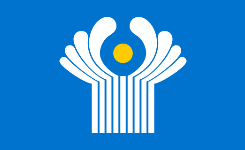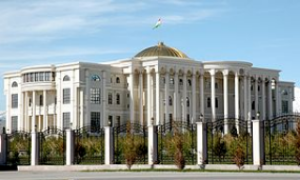Ukraine and the CIS Perspective: Implications for Central Asia
By Farkhod Tolipov (04/04/2014 issue of the CACI Analyst)
The outbreak of Ukraine's "second color revolution" in February has shaken not only Ukraine itself but also the foundations of the Commonwealth of Independent States (CIS). The drastic split of Ukraine as a state and a nation amounted to a moment of truth for the entire post-Soviet structure. The rise of anti-Russian nationalism in Ukraine and Russia's response to annex Crimea revealed not only a persistent Russian neo-imperial stance in the post-Soviet space but also triggered geopolitical concerns among former Soviet countries, including in Central Asia.

Tajikistan's Government Anxious over Crimea
By Oleg Salimov (04/02/2014 issue of the CACI Analyst)
The events in Ukraine and Crimea are a wake-up call for most of Central Asia’s leaders. Although far away from Ukraine, Tajikistan is in the same zone of political and economic influence imposed by Russia. This implies that Tajikistan must consider the possibility of being subjected to a sequence of events similar to those in Crimea. The lack of a comprehensive reaction from Tajikistan’s president, usually supportive of President Putin, to the situation in Crimea can be interpreted as fear that Tajikistan could potentially be absorbed by Russia in part or as a whole. An evaluation of Tajikistan’s political and socioeconomic situation can provide clues to whether Tajikistan is susceptible to a Crimea scenario. 
CACI Analyst, March 19, 2014
Bishkek's First Official Statement on Ukraine
By Arslan Sabyrbekov (03/19/2014 issue of the CACI Analyst)
On March 11, Bishkek made its first official statement on the ongoing crisis in Ukraine. The Kyrgyz Ministry for Foreign Affairs says that the ousted Ukrainian President Viktor Yanukovych can no longer be considered the country’s legitimate leader, as he continues to claim.
Bishkek reacted to Yanukovych's statement on March 11 that he is still Ukraine’s only legitimate President. The Kyrgyz Foreign Ministry stated that the current crisis in Ukraine was caused by widespread corruption and wrong decisions taken by the former authorities of that country. “The only source of power in any country is its people, a president who lost his people’s trust, who de facto lost his presidential authority and moreover, who fled his own country, cannot consider himself to be the legitimate leader,” the statement says. Furthermore, Bishkek described the people who died during the violent clashes in Kiev as “innocent people.”
The statement did not directly mention the critical situation in Crimean peninsula. But Kyrgyzstan expressed its concern over the development of the general situation in Ukraine and condemned all activities aimed at destabilizing the situation in the country, without specifying who it considers to be responsible for destabilization. The Kyrgyz Foreign Ministry also called on the country’s current political leadership and all other actors to use peaceful methods in resolving the crisis and adhere to national and international law, citing specifically the Charter of the United Nations. Thus, the statement implicitly recognizes the new Ukrainian political elite and power holders.
Bishkek's reaction immediately turned into a source of discussion among local political analysts. In the words of the Bishkek based political analyst Marat Kazakpaev, “even though the statement of the Kyrgyz Foreign Ministry against Yanukovych seems to contain some sort of political attack on Moscow, it is in fact very tuned and precise.” According to the expert, the statement from the Kyrgyz MFA will not cause a negative reaction from the Russian leadership, especially taken into account its growing economic presence in the Kyrgyz republic, particularly in the form of gas, hydropower, and mining investment projects.
Based on this opinion, the statement seems to be directed primarily to the domestic audience. On the one hand, it neutralizes a constant claim of the opposition that the current leadership is subordinated to Moscow. On the other hand, it would be illogical for the Kyrgyz authorities, who came to power by means of demonstrations and many casualties to express its support for Yanukovych, who has often been compared to ousted ex-president Kurmanbek Bakiyev. Like Bakiyev, the ousted Ukrainian President Yanukovych had established a heavily corrupt authoritarian regime, used force against demonstrators, and also settled in a foreign country with continuous statements of his legitimacy. Even in terms of foreign policy, the ousted presidents resemble one another in terms of lacking a clear vision and playing with all the big actors in their efforts of maximizing dividends, which were often personal.
On the contrary, political analyst Mars Sariev believes that "the statement of the Kyrgyz Ministry for Foreign Affairs will negatively impact and cool down the Kyrgyz-Russian relations. As a response to this statement, the Russian Federation can and is in a position to block Kyrgyzstan’s entry into the Customs Union under preferable terms and conditions asked by Bishkek." Sariev also recalled that in 2008, Bishkek took another position than that of the Russian Federation over the Ossetia-Abkhazia conflict in Georgia, which at that time did not cause a heavy deterioration but cooled down relations between the two countries.
In turn, the U.S. Embassy in the Kyrgyz Republic issued its own statement commending the Kyrgyz Ministry for Foreign Affairs “for its strong statement recognizing the new Ukrainian government. By condemning all acts that would lead to further destabilization in Crimea and elsewhere, and affirming that the legitimate source of power in any country is the will of its people, the Government of the Kyrgyz Republic has shown respect for the democratic aspirations of both the people of Ukraine and the Kyrgyz Republic.”
While it remains to be seen what this statement will bring, it has turned Kyrgyzstan into the first member of the Russia-led Commonwealth of Independent States with a view that largely contradicts the Kremlin’s.
Crimea is not a Pawn on the Ukraine Chess Board - Russia is There to Stay
By Avinoam Idan (03/19/2014 issue of the CACI Analyst)
Russia’s move to gain control over the Crimean Peninsula deviates from the context of the crisis in Kiev. Gaining control over Crimea is not a tactic in President Putin’s hands vis-à-vis the competition over Ukraine's future. Crimea is not a pawn on the Ukrainian chess-board in the rivalry between Putin and Obama. The Crimean Peninsula is the “queen” in the chess game Putin is playing; it is aimed at nothing less than improving Russia’s position in the entire Black Sea region, as well as in the area referred to as the Mediterranean Basin.






